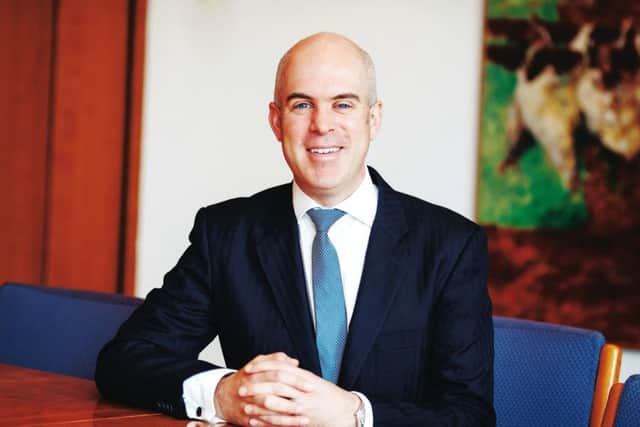How will the rollout of open banking affect me?


“Open banking is the future of retail banking,” says David Goodbrand, who heads law firm Burness Paull’s IP, technology and commercial team in Edinburgh.
“It will revolutionise how we engage with banks and consume banking services.”
Advertisement
Hide AdAdvertisement
Hide AdWe have already experienced a revolution in the way we bank in recent years.


More of us are going paperless, while internet and mobile banking is making it easier for us to manage payments, investments and savings.
However, open banking will see a shift in the balance of power in relation to how our financial data is controlled, used and shared.
“Open banking will enable customers to have more control over their data and to make it easier for banks, fintech companies or other businesses to make use of bank data to deliver new services to customers in a variety of helpful and innovative ways,” explains Goodbrand.
“It will enable customers to share data securely with third parties, compare products on the basis of their own requirements and manage their accounts without necessarily having to interact directly with their bank,” he adds.


This in turn, he says, could lead to a more bespoke experience.
“It is hoped that open banking will also allow banks, fintechs and others to deliver personalised financial advice, precisely tailored to your particular circumstances and delivered both securely and confidentially.”
In the UK, the ball was set in motion for open banking by the Westminster government’s Competition & Markets Authority’s (CMA) four-year retail banking investigation, which began in 2013.
Advertisement
Hide AdAdvertisement
Hide AdAmong other things, it highlighted how the big banks were not being challenged enough. “The investigation concluded older and larger banks do not have to compete hard enough for customers’ business, and smaller and newer banks find it difficult to grow,” says Goodbrand.
“This means that many people are paying more than they should for their banking activities and are not benefiting from new services.”
“A new organisation [Open Banking Ltd] has been set up by Payments UK to implement and deliver open banking,” says Goodbrand.
“It is currently working with the nine banks mandated by the CMA including Barclays, HSBC, Lloyds Banking Group and RBS Group, as well as fintechs and consumer groups.”
Rollout
Open banking in the UK is being rolled out in three stages and the process has already begun.
“Stage one was delivered in March and relates to the sharing of generic information about banks and their accounts, making general information readily available to customers – such as the location of ATMs and branches and the specification for different personal current accounts and business current accounts,” says Goodbrand.
“Data from a number of banks is already available on their websites, with the remainder to follow shortly.”
The next step in the process will take place in January and is perhaps the most significant.
Advertisement
Hide AdAdvertisement
Hide AdThis will see the banks release APIs (application program interfaces) that will – with customers’ permission – allow third-party apps and firms to make payments from customers’ accounts and read their transaction history.
“Stage two is aligned to the upcoming PSD2 which also enables customers to use third-party providers to manage their finances,” says Goodbrand
“It will be interesting to observe the inter-relationship between the CMA order and the imminent PSD2,” he adds.
The third stage is set to be rolled out in the autumn of next year. “It relates to the service quality metrics and development of the APIs as commercial products,” he explains.
“Due to the complexity of this stage, banks may require to further collaborate with technology and fintech companies.”
So what will all this really mean for the consumer? For a start, according to Goodbrand, it could mean not having to remember your banking password every time you want to move your money around – using technology we may already be familiar with.
“Open banking will bring technology to the forefront of financial services. It uses APIs to share information securely, without you having to reveal your password.
“This is the same kind of technology that tells an Uber driver who and where you are or which lets you sign in to other online accounts using Facebook,” he says.
Advertisement
Hide AdAdvertisement
Hide AdBut open banking will offer more than just convenience. It promises empowerment.
“Consumers will be able to gain greater access to new and innovative financial products and services, but they will also gain greater control over who is accessing their information and how it is being used,” says Goodbrand.
“With open banking, apps could use your transaction information to find the current account which suits you best.
“If you run a small business, apps could find the best deals for your business accounts and loans.
“Apps could even help you avoid overdraft charges by moving cash into your account when it dips into the red.”
This all sounds like great news for the customer, but if open banking is going to shake up the industry and wrest some power from the grip of the big banks, perhaps some of them won’t be too happy about all of this. Goodbrand isn’t so sure about that.
“Open banking offers a massive opportunity to all banks – both established and challenger banks,” he says. Indeed, some banks could do rather well out of all this.
“Banks that get their digital proposition right are likely to build on their relationships with their existing customers and are more likely to attract new customers,” he says.
Advertisement
Hide AdAdvertisement
Hide Ad“The banks who invest in open banking and partner with fintechs and others to improve their customer experience and customer services are likely to gain a competitive advantage in the market.
“The banks that build a compelling digital proposition and embrace open banking are likely to improve the ‘stickiness’ of their customer relationships – as customers get used to and enjoy using the bank’s apps, tools and other digital services.”
The idea of your banking data being shared with firms other than your bank might seem a little concerning, but as open banking is implemented, a whole host of regulations related to data will be too. Firms handling your data will have to prove they are able to do so securely, says Goodbrand.
“Open banking is being introduced around about the same time as the General Data Protection Regulations (GDPR) come into effect [in May 2018].
“The GDPR implements an agenda of ‘accountability’ where businesses need to be able to show how they comply with data protection rules, and be more upfront with those affected by the processing of their information,” he explains.
“As a result, the banks will be required to take a greater level of care when processing and sharing customer’s data, and therefore data accountability will be baked in to open banking from day one.”
Heavy punishments will be meted out to any banks which don’t take enough steps to ensure that they and the fintechs they work with protect consumers’ data.
“If the banks fail to do this then, in addition to any reputational damage they could suffer, they will be liable to fines of up to 4 per cent of annual worldwide turnover or €20 million (whichever is the highest), as well as further sanctions from regulators.”
Advertisement
Hide AdAdvertisement
Hide AdFor Goodbrand, one thing is crucial for open banking to be a success: trust. Just as customers of the very first banks needed to trust the strength of the vault’s walls, so too do today’s customers need to be able to count on the technology to keep them and their finances secure.
“Open banking can only operate effectively if all participants buy in to the initiative and a level of trust is established.
“The regulatory changes that we are now seeing – including the introduction of the GDPR – will go a long way to establishing and maintaining the required level of trust,” he says. n